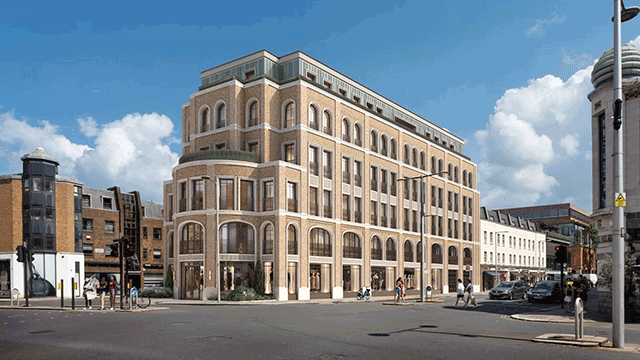Collective enfranchisement – Leasehold Reform, Housing and Urban Development Act 1993 – Determination of price – Development value – Parties having differing views on effect of various statutory provisions on freeholder’s ability to obtain vacant possession for purpose of redevelopment – How legal dispute to be taken into account in valuation – Appeal allowed
The appellant owned the freehold of a terraced property that contained two maisonettes on the upper floors, with a ground-floor flat and basement flat below. The property was subject to a headlease that was due to expire in September 2009. The headlessee occupied the basement flat, while the two maisonettes were let on underleases with the headlessee as the immediate landlord. The ground-floor flat was held on a lease granted under section 56 of the Leasehold Reform, Housing and Urban Development Act 1993 pursuant to the right of lease extension. The tenants of the maisonettes sought to acquire the freehold of the building through the respondent, as nominee purchaser, under the collective enfranchisement provisions of Part I of the 1993 Act.
A leasehold valuation tribunal (LVT) determined the price payable to the appellant on enfranchisement to be £2,164,946. In reaching that figure, it found that planning permission would probably be granted for the conversion of the building into a single family house. However, it held that no uplift in value should be attributed to this, over the existing value as four units of accommodation, since problems in obtaining vacant possession of the property would deter potential purchasers from increasing their bids to reflect the development prospects.
The problems it identified included: (i) the prospect that the headlessee might enjoy security of tenure of the basement flat, under section 186 of, and Schedule 10 to, the Local Government and Housing Act 1989, if she were found to be occupying it as her only or principal home; and (ii) the risk that the freeholder might not be able to obtain possession of flat 1, under section 61 of the 1993 Act, for the purposes of redevelopment, if it were held that the headlessee, not the freeholder, was the relevant “landlord” for that purpose, and the potential compensation claim from the tenant if that were the case.
Permission was given for an appeal from the LVT’s decision by way of rehearing. Issues arose as to the correct approach on the appeal, in particular how the Lands Tribunal (LT) should deal with the unresolved legal question regarding the effect of section 61 of the 1993 Act.
Decision: The appeal was allowed.
(1) The LT had to decide any point that arose for the purpose of resolving the dispute between two parties, but it did not have to decide whether the freeholder had the right to claim possession under section 61 of the 1993 Act or whether a tenant with a claim to compensation would be entitled to a ransom position. It should not purport to decide those disputed points of law since they did not arise for decision on an assessment of the value of the freeholder’s interest in accordance with para 3 of Schedule 6 to the 1993 Act. The correct approach on such a valuation was to form a view as to what the hypothetical purchaser of the freehold would have been advised when contemplating the purchase, and to consider the extent to which the alleged difficulties in obtaining vacant possession before the end of the headlease would affect the mind of that purchaser when deciding how much to bid for the freeholder’s interest. Although it was to be assumed that such a purchaser would have been properly advised, it would not have had the benefit of any court or tribunal decision on the points at issue. Consequently, the LT’s task was not to make an all-or-nothing analysis of the legal points, but to appraise how the hypothetical purchaser’s view of those problems would affect the value of the freeholder’s interest: Floe Telecom Ltd (in administration) v Office of Telecommunications [2009] EWCA Civ 47 applied.
Moreover, although legal advice might range from the ultra-cautious to the over-optimistic, a potential purchaser that received the former would be unlikely to make the highest bid or be the successful purchaser; accordingly, the successful hypothetical purchaser was to be assumed to have received sound and responsible, but not over-optimistic, advice.
(2) In the instant case, the hypothetical purchaser would probably be advised that the prospect of redevelopment offered substantial extra value but that, in order to secure that development and avoid potential problems in obtaining vacant possession, it should negotiate the early surrender of the headlease and the voluntary vacation of the basement and ground-floor flats by their respective tenants, for which both would expect a generous payment. Although the hypothetical purchaser would recognise the possibility that either or both would refuse to vacate voluntarily, that prospect would not deter it from making an additional bid for the freeholder’s interest over and above the value attributable to the building as flats because it would recognise that the lessees would gain substantial advantage in reaching an attractive early settlement for a share of the extra development value rather than pressing on in hostile litigation. Further, the hypothetical purchaser would decide that the risk of not obtaining the appropriate planning permission was small. Valuing the freehold with continued use as flats at £2.088m, and the full vacant possession value at £4.085m, and factoring in the above matters, the appropriate price on enfranchisement was £2.383m.
Anthony Radevsky (instructed by Pemberton Greenish) appeared for the appellant; Thomas Jefferies (instructed by Maxwell Winward) appeared for the respondent.
Sally Dobson, barrister










